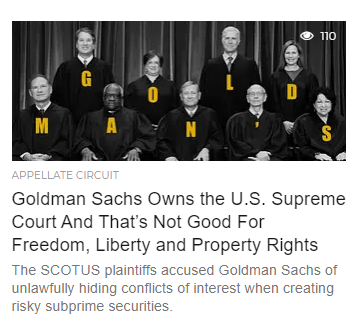Appellate Judges
Supreme Court Justice and Former Seventh Circuit Judge Cries Fake Tears About Public Perception
Justice Barrett is originally from Louisiana and while sitting on the Seventh Circuit was keen to cite to published 5th Cir. Precedent first.

Barrett concerned about public perception of Supreme Court
Justices must be “hyper vigilant to make sure they’re not letting personal biases creep into their decisions, since judges are people, too,” she said.
SEP12, 2021 | REPUBLISHED BY LIT: SEP 14, 2021
In re A.F. Moore & Assocs., 974 F.3d 836, 841 (7th Cir. 2020)
Error: invalid ipages flipbook database record
We do not doubt that the district court acted in good faith when resolving the motion before it, but had it considered the appropriate standard for a stay pending a petition for a writ of certiorari, it may well have realized that its position was fraught.
The defendants’ motion obligated the district court, which had been reversed by a reviewing court, to weigh the likelihood that it might be later vindicated by our own reversal.
That analysis is only a step removed from a court declaring that it was right all along and entering the judgment just reversed—the most obvious violation of the mandate rule.
See Deutsche Bank Nat’l Tr. Co. v. Burke , 902 F.3d 548, 551 (5th Cir. 2018) ;
Barrow v. Falck , 11 F.3d 729, 730 (7th Cir. 1993).
District courts have routinely refused invitations to engage in this sort of stay calculation for just that reason.
See, e.g. , William A. Graham Co. v. Haughey , 794 F. Supp. 2d 566, 569 (E.D. Pa. 2011) ; Lentz , 352 F. Supp. 2d at 726 ; Mister v. Illinois Cent. Gulf R.R , 680 F. Supp. 297, 299 (S.D. Ill. 1988) ; Studiengesellschaft Kohle, mbH v. Novamont Corp. , 578 F. Supp. 78, 80 (S.D.N.Y. 1983).
In this case, an additional factor dispelled any doubt about whether the district court could go down this road: we had already denied the defendants’ request for the very same relief.
Once we refused to stay the mandate, the taxpayers’ only recourse was with the Supreme Court, which has ample authority to stay our judgment under § 2101(f) or otherwise.
See S. CT. R. 23 ; Ohio Citizens for Responsible Energy, Inc. v. NRC , 479 U.S. 1312, 1312, 107 S.Ct. 682, 93 L.Ed.2d 692 (1986) (Scalia, J., in chambers) (noting authority to issue stay even when § 2101(f) does not apply).
The district court, in contrast, was not in a position to overrule us.
Supreme Court Justice Amy Coney Barrett expressed concerns Sunday that the public may increasingly see the court as a partisan institution.
Justices must be “hyper vigilant to make sure they’re not letting personal biases creep into their decisions, since judges are people, too,” Barrett said at a lecture hosted by the University of Louisville’s McConnell Center.
Supreme Court Justice Amy Coney Barrett expressed concerns Sunday that the public may increasingly see the court as a partisan institution.
Justices must be “hyper vigilant to make sure they’re not letting personal biases creep into their decisions, since judges are people, too,” Barrett said at a lecture hosted by the University of Louisville’s McConnell Center.
Introduced by Senate Republican leader Mitch McConnell, who founded the center and played a key role in pushing through her confirmation in the last days of the Trump administration, Barrett spoke at length about her desire for others to see the Supreme Court as nonpartisan.
Barrett said the media’s reporting of opinions doesn’t capture the deliberative process in reaching those decisions. And she insisted that “judicial philosophies are not the same as political parties.”
“To say the court’s reasoning is flawed is different from saying the court is acting in a partisan manner,”
said Barrett, whose confirmation to the seat left open by the death of the liberal Justice Ruth Bader Ginsburg cemented conservative control of the court.
“I think we need to evaluate what the court is doing on its own terms.”
Barrett’s comments followed a high-profile decision earlier this month in which the court by 5-4 vote declined to step in to stop a Texas law banning most abortions from going into effect, prompting outrage from abortion rights groups and President Joe Biden.
Barrett was asked about that decision by students who submitted questions in advance and also asked about another recent decision by the court in which it refused to block a lower court ruling ordering the Biden administration to reinstate a Trump-era program informally known as Remain in Mexico.
Barrett said it would be “inappropriate” to comment on specific cases.
Several supporters of abortion rights demonstrated outside the Seelbach Hotel, where the private event was held.
Barrett, 49, also spoke about her introduction to the court in the midst of the coronavirus pandemic, saying it “certainly is a different experience.” The court has for more than a year been hearing arguments by telephone though it recently announced a return to the courtroom in October.
Barrett described the court as a “warm, collegial place.” She said that after she was confirmed a colleague brought Halloween candy for her children. The first mother of school-age children on the nine-member court also spoke about balancing her job and family life.
Who is the Outlaw Chief Judge at the Fifth Circuit who is going down for crimes against the elderly? https://t.co/ZopwvRMgMC@CivilRights @TheJusticeDept @600camp @JudgeDillard @USMarshalsHQ @Telegraph @wolfblitzer @FoxNews @FOX26Houston @fox7austin @HoustonChron @Law360 #txlege pic.twitter.com/U5HXcOkxHI
— LawsInTexas (@lawsintexasusa) August 4, 2021
“I have an important job, but I certainly am no more important than anyone else in the grocery store checkout line,” Barrett said, describing how her relationship with her children — who are not “particularly impressed” with her high-profile post — helps her stay grounded in her “regular life” where she is busy “running carpools, throwing birthday parties, being ordered around.”
When asked what advice she would give to young women who would like to pursue a career in public service, the justice said she would like young women to know it is possible to raise a family and be successful.
Barrett was confirmed by the Senate in a 52-48 vote last year, a little over a month after Ginsburg’s death.
Democrats opposed her nomination, arguing that the process was rushed and that the winner of the 2020 presidential election should have been able to choose Ginsburg’s replacement. McConnell’s decision to move forward with Barrett’s nomination was a contrast to the position he took in 2016, when he refused to consider President Barack Obama’s choice to fill the seat left vacant by the death of Justice Antonin Scalia in February of that year. McConnell blocked hearings for then-judge Merrick Garland, now Biden’s attorney general, saying the choice should be left to voters in an election year.
The lecture was held in celebration of the McConnell Center’s 30th anniversary. Founded in 1991, the nonpartisan center provides educational and scholarship opportunities to students at the University of Louisville.
Three other Supreme Court Justices, most recently Justice Neil Gorsuch, have spoken at the center.


















